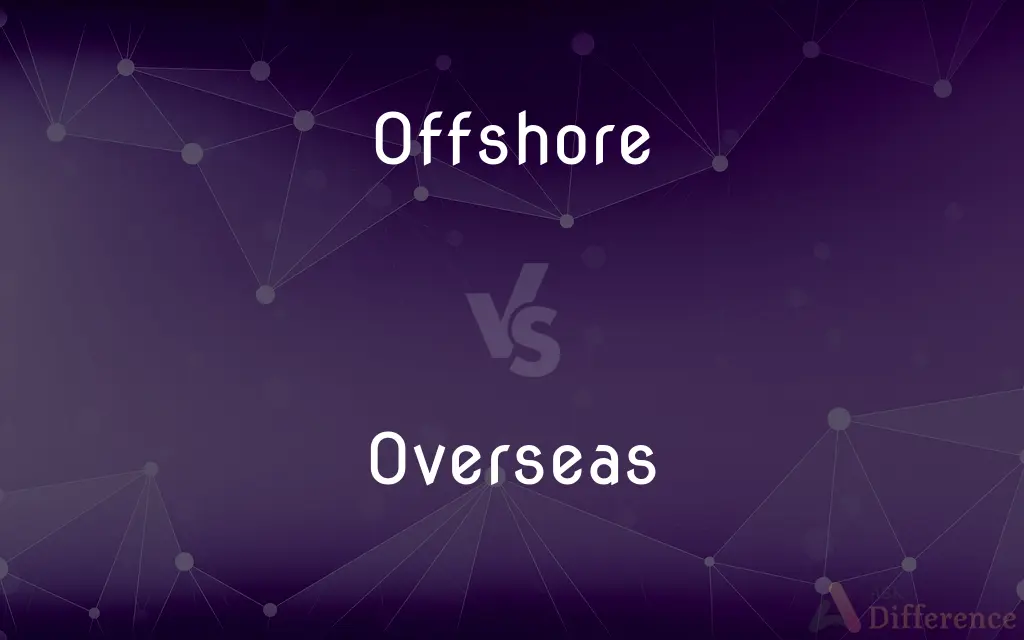Offshore vs. Overseas — What's the Difference?
By Fiza Rafique & Maham Liaqat — Updated on April 8, 2024
Offshore refers to activities conducted away from one's own country's coast, often in relation to finance or drilling, while overseas pertains to anything located or occurring in a foreign country, especially across the sea.

Difference Between Offshore and Overseas
Table of Contents
ADVERTISEMENT
Key Differences
Offshore activities typically involve financial services, like banking, investing, and insurance, set up in jurisdictions outside one’s home country to gain legal and tax advantages. Meanwhile, overseas is a broader term that encompasses any type of activity, business, or presence in another country, often implying a significant geographical distance or across a sea from the home country. Offshore is thus a subset of activities that can be considered as part of what might happen overseas but is more specific in its implications and usage.
In the context of businesses, offshore often implies the relocation or setup of specific operations outside the home country to benefit from lower taxes, less stringent regulations, or more favorable economic conditions. This can include manufacturing, customer service, and especially financial operations. On the other hand, overseas business activities might not necessarily seek financial benefits but can aim to expand market reach, source materials, or establish international partnerships, reflecting a broader range of motivations beyond financial incentives.
Regarding legal and regulatory frameworks, offshore jurisdictions are selected for their ability to provide secrecy, reduced regulatory oversight, and financial benefits. These locations are specifically chosen for their legal environments that favor the protection of assets and anonymity of owners. Conversely, conducting business or moving operations overseas doesn’t inherently aim for these benefits and might be motivated by market expansion, logistics, or access to specific skills or technologies not available in the home country.
The concept of offshore can also relate to the physical extraction of resources, such as offshore drilling for oil and gas, which occurs in the sea away from the coast. This specific usage underscores the geographical and operational distinctiveness of the term. In contrast, overseas does not imply any specific industry or activity but simply indicates that an action or entity is based in another country, which can include a wide range of sectors and motives.
While both terms imply a cross-border element, offshore carries connotations of tax avoidance, secrecy, or specific industrial activities like drilling, which are absent from the more neutral and broad-ranging term overseas. Overseas encompasses a wide variety of activities without the specific legal, financial, or industrial implications often associated with offshore operations. Understanding the distinction is crucial for grasping the nuances of international business, finance, and law.
ADVERTISEMENT
Comparison Chart
Definition
Activities conducted away from one's own country's coast, often for financial benefits.
Anything located or occurring in a foreign country, typically across the sea.
Common Uses
Financial services, resource extraction.
General international activity, including travel, business, and living.
Motivations
Tax advantages, legal benefits, secrecy.
Market expansion, sourcing, international presence.
Legal and Regulatory Context
Chosen for specific legal environments that offer financial benefits and privacy.
Broad range of activities without specific legal or financial implications.
Industry Implications
Often associated with finance and drilling industries.
Applies to any industry or sector engaging in international operations.
Compare with Definitions
Offshore
Implies activities aimed at leveraging regulatory, tax, or economic advantages.
Offshore investments can be part of a diversified portfolio.
Overseas
Pertaining to countries across the sea or in a foreign land.
Overseas markets offer new opportunities for expansion.
Offshore
Associated with legal frameworks favorable to privacy and asset protection.
Offshore trusts are used to safeguard assets.
Overseas
Relates to individuals living or traveling in another country.
Studying overseas provides invaluable cultural experiences.
Offshore
Involving the extraction of resources away from the coast.
Offshore drilling operations are essential for oil extraction.
Overseas
Encompasses a wide range of international interactions.
Overseas collaborations can lead to innovative projects.
Offshore
Operations set up in another country to gain economic benefits.
Many companies establish offshore subsidiaries to reduce costs.
Overseas
Activities or operations conducted abroad, not limited to financial motives.
The company has several overseas manufacturing plants.
Offshore
Relating to financial activities conducted in foreign jurisdictions for benefits.
Offshore banking accounts can offer tax advantages.
Overseas
Implies a geographical and operational extension beyond national borders.
Expanding business overseas requires understanding local regulations.
Offshore
Moving or directed away from the shore
An offshore wind.
Overseas
In or to a foreign country, especially one across the sea
He spent quite a lot of time working overseas
Offshore
Located at a distance from the shore
An offshore mooring.
Offshore oil-drilling platforms.
Overseas
From, to, or relating to a foreign country, especially one across the sea
Overseas trips
Offshore
Located or based in a foreign country and not subject to tax laws
Offshore bank accounts.
Offshore investments.
Overseas
Beyond the sea; abroad.
Offshore
Away from the shore
The storm moved offshore.
Overseas
Of, relating to, originating in, or situated in countries across the sea.
Offshore
At a distance from the shore
A boat moored offshore.
Overseas
Abroad.
Overseas branches of the company are doing well.
Offshore
The comparatively flat region of submerged land extending seaward from beyond the region where breakers form to the edge of the continental shelf.
Overseas
Used with ethnicities, nationalities, or religious affiliations: living (being resident) in a foreign country.
Overseas Chinese communities exist in North and South America.
Offshore
To outsource (production or services) to another country.
Overseas
Across a sea; to or in an area across a sea.
Her overseas trip went well.
Offshore
Moving away from the shore.
Overseas
Abroad.
He emigrated and now lives overseas.
Offshore
Located in the sea away from the coast.
An offshore oil rig
Overseas
Across a sea; to an area across a sea.
She travelled overseas.
Offshore
Located in another country, especially one having beneficial tax laws or labor costs.
Overseas
In a foreign country;
Markets abroad
Overseas markets
Offshore
Away from the shore.
Overseas
Being or passing over or across the sea;
Some overseas trade in grain arose
Offshore
At some distance from the shore.
Overseas
Beyond or across the sea;
He lived overseas for many years
Offshore
To move industrial production from one region to another or from one country to another, usually seeking lower business costs, like labor.
Overseas
In a place across an ocean
Offshore
An area or or portion of sea away from the shore.
Offshore
An island, outcrop, or other land away from shore.
Offshore
Something or someone in, from, or associated with another country.
Offshore
From the shore; as, an offshore wind; an offshore signal.
Offshore
Located in the waters near the shore; as, offshore drilling.
Offshore
Operating or located in a foreign country; as, an offshore bank account; offshore mutual funds.
Offshore
(of winds) coming from the land;
Offshore winds
Offshore
At some distance from the shore;
Offshore oil reserves
An offshore island
Offshore
Away from shore; away from land;
Cruising three miles offshore
Common Curiosities
Can a company be both offshore and overseas?
Yes, a company can operate both offshore and overseas if it engages in activities abroad for specific financial benefits (offshore) and has a presence in foreign markets for broader operational reasons (overseas).
How does an overseas operation differ from an offshore operation?
Overseas operations encompass a broader range of activities in foreign countries without the specific financial or regulatory motivations that characterize offshore operations.
Is offshore banking illegal?
Offshore banking itself is not illegal, but it can be associated with tax evasion or money laundering if not reported correctly to tax authorities.
What is offshore finance?
Offshore finance refers to financial activities conducted in jurisdictions outside one’s home country, often to gain tax or legal advantages.
What are the benefits of operating overseas?
Operating overseas can help companies access new markets, source materials or labor at lower costs, and achieve global expansion.
Why do companies go offshore?
Companies go offshore to benefit from lower taxes, less stringent regulations, and other financial incentives offered by certain jurisdictions.
What legal considerations are there for offshore operations?
Offshore operations must navigate international law, tax regulations, and the legal frameworks of host countries, often requiring specialized legal expertise.
What motivates individuals to move overseas?
Individuals may move overseas for various reasons, including employment opportunities, education, lifestyle changes, or personal growth experiences.
What role does technology play in offshore and overseas operations?
Technology facilitates offshore and overseas operations through improved communication, data management, remote work capabilities, and operational efficiency.
How does offshore drilling impact the environment?
Offshore drilling can have significant environmental impacts, including the risk of oil spills, damage to marine ecosystems, and contribution to climate change.
What factors should be considered before expanding business overseas?
Before expanding overseas, factors such as market demand, legal and regulatory environment, cultural differences, and local competition should be considered.
How do offshore and overseas activities contribute to globalization?
They contribute to globalization by increasing international trade, financial flows, cultural exchanges, and the global integration of markets and economies.
Can studying overseas affect one’s career prospects?
Yes, studying overseas can enhance career prospects by providing international exposure, cross-cultural skills, and a global network.
What are the risks of offshore investments?
Offshore investments carry risks related to political stability, regulatory changes, currency fluctuations, and potential reputational damage.
How do global economic trends affect overseas business?
Global economic trends can influence overseas business by affecting exchange rates, consumer demand, supply chain logistics, and international trade policies.
Share Your Discovery

Previous Comparison
Urinal vs. Pissoir
Next Comparison
Propose vs. PoseAuthor Spotlight
Written by
Fiza RafiqueFiza Rafique is a skilled content writer at AskDifference.com, where she meticulously refines and enhances written pieces. Drawing from her vast editorial expertise, Fiza ensures clarity, accuracy, and precision in every article. Passionate about language, she continually seeks to elevate the quality of content for readers worldwide.
Co-written by
Maham Liaqat















































